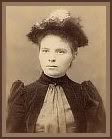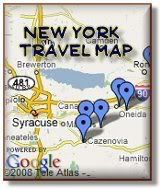A Day in History
Saturday, January 10, 2009
My local newspaper has a very nice feature called "This Week in History." I like it. It's got short articles with snippets from various newspapers (this was back when my area had more than one paper) in various years gone by. It's done by Frank Tomaino. It's interesting to see what happened and what made the papers long ago. It's also extremely interesting to see how people thought and did things long ago, and what they believed was proper (or not). A few of today's snippets stood out to me:
1861, 148 years ago
Suffragette silenced
Famed suffragette Susan B. Anthony and 25 abolitionists are not permitted to speak in Mechanics Hall in Utica. Her scheduled talk – titled “No Compromise with Slavery” – is canceled by the Common Council and directors of the Mechanics Association after many Uticans say they fear such a large abolitionist gathering may cause a riot – as such gatherings have recently in Buffalo and Rochester.
As hundreds crowd around Mechanics Hall at Liberty and Hotel streets to stop the suffragette from entering the building, she is escorted through the crowd by Mayor DeWitt C. Grove – who does not agree with the cancellation – and is taken to a store on lower Genesee Street until the crowd disperses. She spends the rest of the day in a private residence.
Susan B. Anthony is most noted as the icon of "voting rights for women." She is lesser known for her firm stance against slavery (and she was anti-abortion, too). I think to only remember her work for voting rights is a shame-- she was an activist for women's rights, that women were also endowed by their Creator with certain inalienable rights. She was just as active with the anti-alcohol movement, the anti-corset movement, and was vehemently against prostitution. She protested male doctors for women and believed it was sin for a woman to live in poverty and sickness because a husband deemed it so. She was a great lady.
Anthony grew up in Upstate New York when religious revival fires were burning from the ministry of Charles G. Finney. (Finney was scandalized for allowing women to pray in church service!) Those revivals had a tremendous effect on Upstate NY, essentially creating a new awareness and movement of women's rights as equal citizens, Negroes as equal human beings, and government's role as impartial servant and not the corrupt master (the Whig political party, which protested government corruption and called for more open and virtuous government, was formed during Finney's time). I have studied Finney's life and can say that much of what happened in Upstate NY during the 1830s to 1850s affected the entire nation up until the Antebellum era after the Civil War. After the 1870s, masses of European immigrants (who did not have the heritage of inalienable rights or religious reform) watered the movement down. New York was filled with Irish and Italian immigrants, completely changing the demographic landscape and creating the New York we have now. I am not against Irish and Italians! But the surge of large numbers of people from those countries completely altered New York State from what it had once been.
And I also saw this headline. It made me chuckle.
1909, 100 years ago
No snowballs, please
Utica City Judge James K. O’Connor fines a 17-year-old boy $5 for throwing a snowball at a pedestrian. “I want it clearly understood,” the judge says, “that every person arrested and brought before me for throwing snowballs at people will receive a similar fine. Too many Uticans have been injured by snowballs.”
Back then, the boy's parents probably tanned his hide for his bad behavior. More than likely today, the boy would have a legal team to challenge the ruling...
0
remarks
Subscribe to:
Post Comments (Atom)






Post a Comment